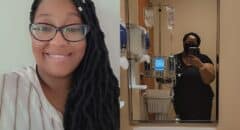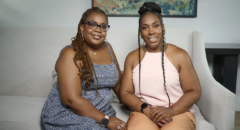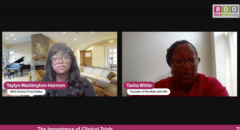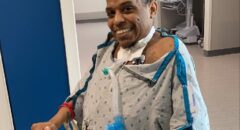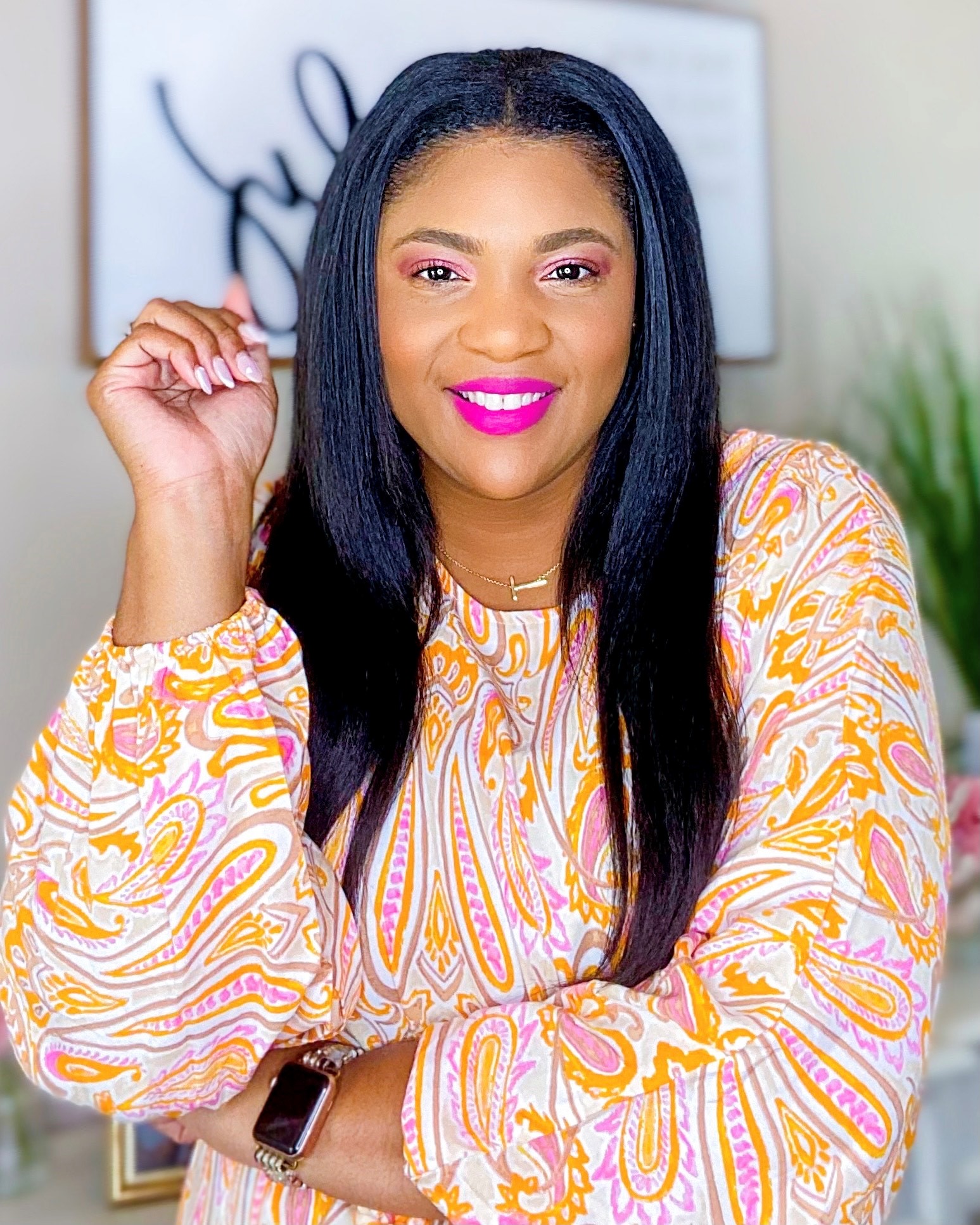
Most people spend their 20s exploring, finding themselves, and figuring out what they want to do in life, but what happens when an unexpected diagnosis stops you in your tracks?
Tamron Little was only 21 when she was diagnosed with peritoneal mesothelioma, a rare, aggressive, and deadly form of cancer that occurs in the thin layer of tissue that covers the majority of the internal organs.
At the time, Little was in her second year of college and pregnant with her first son, Caleb.
“I was at school all day during this pregnancy. I was really sick, with extreme fatigue, which I thought was just because I was pregnant. It was a lot…I was really hard on myself because I did not want to drop out. I did not want to be known as a college dropout even though I was pregnant,” Little says, adding that she was the first one in her family to go to college.
Eventually, she did have to drop out of college and return home.
During a routine ultrasound, doctors noticed a growth in her abdomen.
“I was originally diagnosed with a fibroid that they found during my four-month ultrasound. They told me not to worry about it because in a woman of color my age fibroid tumors were normal,” Little says.
Nearly a quarter of Black women between 18 and 30 have fibroids, which can sometimes grow during pregnancy. In most cases, they’re benign. However, for some women, the tumor may actually be cancerous.
Heeding the doctors’ advice, Little didn’t worry about the fibroid tumor. Little’s mom and aunts also had fibroids, so the thought of cancer never crossed her mind.
In fact, the mother of four didn’t learn the tumors were actually cancerous until after she gave birth.
“After I had my son and my doctor was actually being cautious, we decided to do surgery because the fibroid tumor increased in size,” Little shares. “That’s when I found out that I had peritoneal mesothelioma.”
Although the cancer was found early, which she credits to her son, she was given a poor prognosis.
After receiving cytoreductive surgery, hyperthermic intraperitoneal chemotherapy, and intensity-modulated radiation therapy, Little was given just 18 months to live. Little processed the prognosis in stages, one of which included initial shock.
She describes hearing the diagnosis as a tornado. “…Within the eye, everything is still and quiet, but outside of the ey,e everything is going haywire. Everything is going crazy. That’s pretty much how I felt originally. It was initial shock, and then after the initial shock, it was the why me phase–you know, feeling sorry for myself and what did I do,” Little recalls adding that she wanted to be around for her newborn son.
Next, the writer and blogger went through a stage of euphoria. “My mind was already on the other side…during the time I was going through everything so I didn’t process that I had cancer. I was just going through, OK you know I need to do this, I need to do that and I really didn’t process it until after the fact,” Little adds.
Her hopes were crushed when she went to see an oncologist who didn’t know anything about mesothelioma.
“I feel as if he was stringing me along and just waiting till the end to call in palliative care, and I wasn’t standing for that, so I started asking questions. If he couldn’t answer them, I would say, ‘OK well, can you find me a doctor who can? If you can’t help me– if you don’t have a treatment plan for me, find me a doctor who can,’” Little says.

Fortunately, Little had a strong mother by her side who helped her advocate for herself.
“She worked within the healthcare system during that time– she was my voice. She told everybody, and word got around and they said well ‘Hey we know of this oncologist and he’s actually the only one in North Carolina on the East Coast that specializes in this cancer’ and so they said ‘We can actually put you in contact.’ And of course, my mom–I think she even went down there– she called,” Little shares. She really helped pave the way and helped [me] navigate while I was looking at other areas and my husband was looking in other areas. She really taught me how…sometimes you have to ask questions because if you don’t ask questions, no one knows what you need.”
Seeing Dr. Edward Levine at Wake Forest Baptist Medical Center was like night and day from the oncologist she had previously seen.
“He was the first doctor that actually sat down with me,” she shares. She says Dr. Levine actually took the time to explain the rare disease. He also mentioned that she would be a great candidate for a treatment he had in mind because she was young and healthy and didn’t have any core mobility.
Now, more than a decade later, Little is cancer-free. The cancer survivor was also able to return to college and obtain her bachelor’s and masters after a seven-year hiatus.
She’s grateful that she found a doctor who completely turned her prognosis around. Little, who joined asbestos.com in 2018 as a contributing writer, is also working as an advocate.
Little recently shared her story as part of Bristol Myers Squibb’s Survivorship Today, which is a series that aims to help advance the understanding of what it’s like to live with cancer today.
She hopes her “one in a million” cancer diagnosis, as described by Dr. Levine, will help other young, Black patients like herself who may be struggling to find people who look like them living with mesothelioma, which typically affects older white males in their mid to late 60s.
“My life is not how it was before I had cancer, but what I can say now is that I’ve been through something. I have experience. I can extend hope to other women. I can be an advocate for other women, and I’ve grown spiritually, I’ve grown mentally stronger, I’m more intuitive with my health and my body. It’s all about your perception,” she adds.
Little’s Tips For Others Living With Rare Diseases
- Be your own advocate: “Be your own advocate, ask those questions, be in the driver’s seat during your journey, and remember that hope is not lost, no matter what the doctors say–no matter what your test results say– hope is not lost.
- Share your story: “Share your story because your story, your insight, your experience–whatever you’re going through– it can help someone else.”
- Don’t dwell in the darkness: “Some may say well, you can’t be positive all the time, and that’s true, but even when you’re in your lowest of lows–even when you feel like you are in your darkest days– that’s fine but don’t dwell in it. Don’t dwell in it so much that you become darkness. Don’t dwell in it so much that you become sorrowful. Don’t dwell in it so much that you become your symptoms. It’s OK to address it. It’s OK to process how you’re feeling, write it down, talk to your therapist, pray about it, but don’t dwell in it.”



